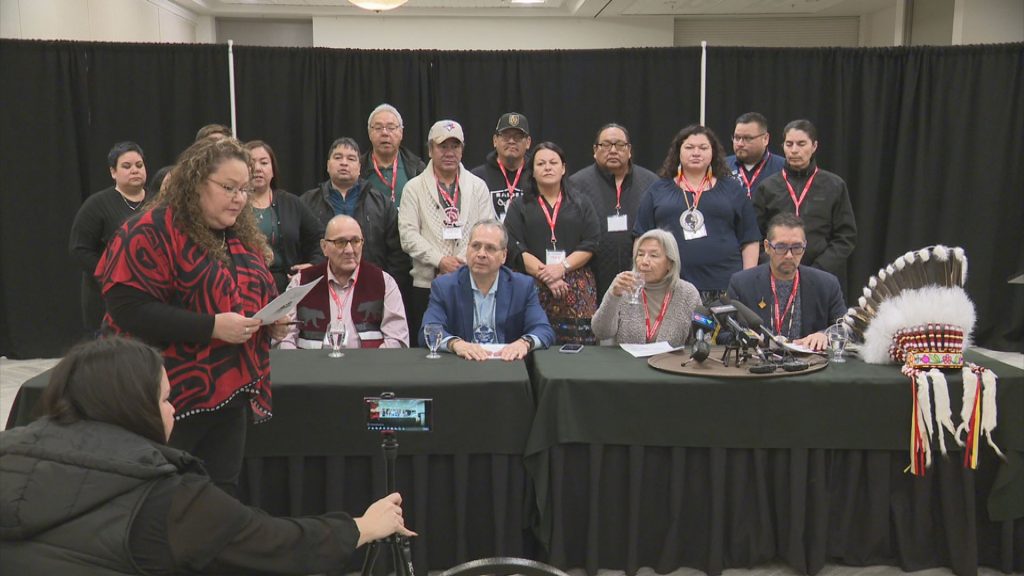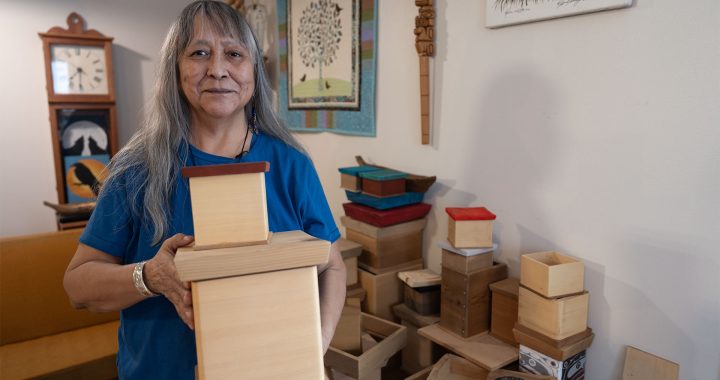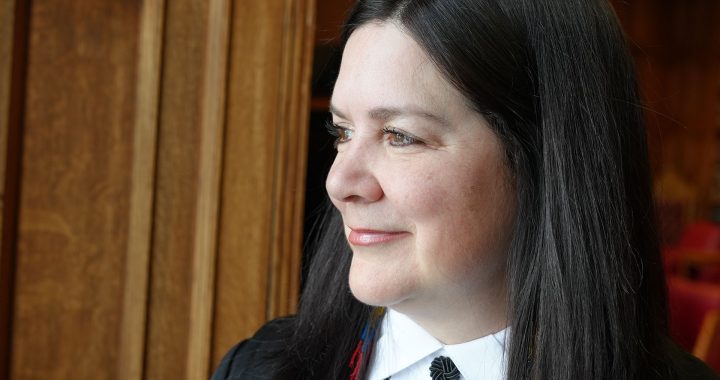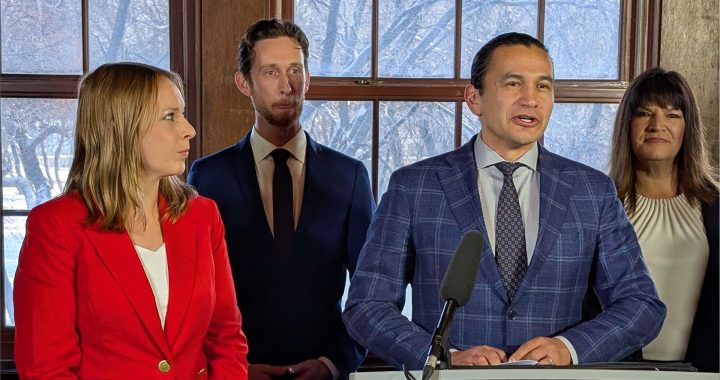
Chiefs in Manitoba at a news conference Wednesday to discuss budget issues around Jordan's Principle. Photo: APTN.
A case worker for the Jordan’s Principle program in the Island Lake region in Manitoba says that children who were flown to Winnipeg for health services were forced to find their own accommodations and food after the federal government cut services.
Rochelle Creasy, the Jordan’s Principle tribal service coordinator for the Four Arrows Regional Health Authority, who spoke at a chief’s meeting organized in Manitoba on Wednesday, said the incident happened on Oct. 23.
“We had children walking the streets that evening, looking for a place to stay,” Creasy said. “They’re sharing meal vouchers just to cover accommodations, so children are going hungry right now. We also have to cover the airfares to get them back home, as well as their meals.”
Creasy didn’t say how many children were involved.
The Island Lake region in Manitoba is one of the most remote areas in Canada, lacks a winter road and requires travelers to use helicopters to reach the nearest airport.
With no alternative, residents are entirely dependent on travel to cities to access health services and that includes children covered by Jordan’s Principle, a hard-fought-for policy that is supposed to ensure kids get care without any squabbling between governments over who is going to pay.
Recently, case workers in these communities were informed that requests for travel companions – a parent or guardian —would now need to be reviewed by the Indigenous Services Canada’s (ISC) national office.
This story is just one of many shared by frustrated chiefs and case workers at a conference hosted by the Assembly of Manitoba Chiefs (AMC). They expressed concerns that long-awaited programs and services for First Nations children might be cut, or that the expenses bands are covering out of pocket may not be reimbursed.
AMC acting Grand Chief Betsy Kennedy said at a news conference, held Wednesday afternoon, that Canada should not be changing the criteria or the way it administers the program because it is not in line with what chiefs were told to do, which was to “spend, spend, spend” on the health and social services children need under Jordan’s principle.
“I understand that there are legal actions that can be taken,” Kennedy said, adding that Jordan’s Principle is not merely a program but a legal obligation.
According to the AMC, a crisis regarding Jordan’s Principle funding has led to “alarming service denials and delays,” with a backlog of 6,000 applications in Manitoba. National the number sits at 140,000 applications. The federal government told the Canadian Human Rights Tribunal that 20,000 of those cases are marked as urgent.
First Nations who are waiting to be paid back are worried that federal monies set aside aren’t enough and they could be stuck holding the bills. Some communities are already running in deficit and cutting services.
“Every one of the First Nations will be declaring a state of emergency regarding Jordan’s Principle” said Chief David Monias of the Pimicikamak Cree Nation (Cross Lake), who was recently appointed to the national children’s chief’s commission.
A resolution passed at the AFN gathering in Ottawa in early December tasked the commission with negotiating a settlement agreement for children in care, including a long-term plan to reform Jordan’s Principle.
Crystal Garson, a Jordan’s Principle case worker with Fisher River Cree Nation, said that ISC told her in a technical advisory meeting on Dec. 11 that Jordan’s Principle could face significant cuts and “to prepare for the worst, but hope for the best, that significant cutbacks were going to happen and to expect layoffs.”
Officials with ISC attended the chief’s meeting ahead of the news conference to take questions.
Rod Graham, acting regional executive officer with ISC Manitoba, said there aren’t a lot of answers in terms of money.
“When I was asked about budgets, I said I don’t know what the budget’s are because I don’t,” Graham told chiefs. “I don’t know what next year’s budget is going to be.”
In the 2022 federal budget, $750 million was set aside for Jordan’s Principle services, which was intended to fund the program until 2028, according to Julien Castonguay, the interim assistant deputy minister at ISC for Jordan’s Principle who attended the conference by video.
Castonguay said when demands go up, additional funding is requested, but there is no guarantee it will be granted.
There is now an effort to screen and review cases coming in, but what qualifies as a Jordan’s Principle case is being subject to more scrutiny by the national ISC office.
“What’s eligible, what’s not eligible, what’s gray. Those are the kinds of things we’re looking at,” said Graham.
While the two public servants spent more than two hours taking questions from chiefs, the lack of specific answers led to frustration, sometimes boiling over.
Raymond Brown, chief of the Canupawakpa Dakota Nation, one of three First Nations that managed to get a Jordan’s Principle service building constructed where children can get care, said his band fronted more than $1 million to have it built.
“Am I going to get reimbursed back? Because the band put forward the money to pay for that,” Brown asked, saying he’s been trying to meet with ISC officials for six months. “When am I going to get that reimbursement back, today, tomorrow or next year? Is it in the process?”
Fifty-two First Nations are in the queue to get a Jordan’s Principle service building.
Wasagamack First Nation First Nations it’s fronting medical bills of $1,000 per day for medical care for a child who has been waiting weeks for approval by ISC, said Creasy.
Castonguay, who was only appointed two months ago, was frequently put on the spot by chiefs, as discussions sometimes got heated as chiefs and case workers became frustrated at times with responses.
“I didn’t get an answer to my question,” said one caseworker to her chief as she turned away form the mic, “and I don’t think we’re going to get one.”
“The apathy that came through in your voice,” Nisichawayasihk Cree Nation Chief Angela Levasseur told Castonguay. “We are talking about our children here. Okay? We’re not talking about something that doesn’t matter, something that’s not important. We’re talking about our most precious resource, and your behavior today was totally and completely unacceptable.”
Read More:
Jordan’s Principle backlog ‘code worde’ for inaction: Blackstock
Chiefs say Ottawa owes First Nations millions of dollars in compensation for Jordan’s Principle
The Jordan’s Principle was implemented after Parliament passed a motion in 2007. It’s named after Jordan River Anderson, a boy with numerous health needs from Norway House Cree Nation, who was stuck in a Winnipeg hospital while the provincial and federal governments argued over who would pay for his care at home.
He died in hospital.
Jordan’s Principle stipulates that when a request for help comes in, the first jurisdiction pays and then works out the reimbursement later.
In 2016, the Canadian Human Rights Tribunal ruled that the federal government’s definition of Jordan’s Principle was discriminatory, because it was limited to children with complex medical needs and multiple service providers.
Editor’s Note: The story was corrected to say that $750 million was promised in the 2022 federal budget – not the 2002 budget as the story originally said.










